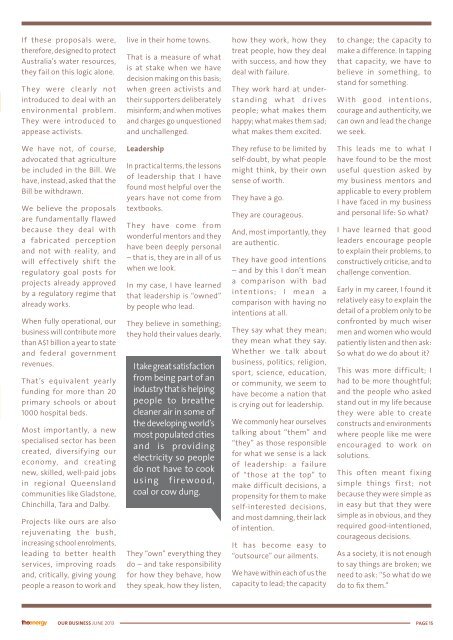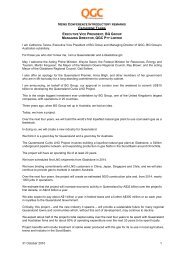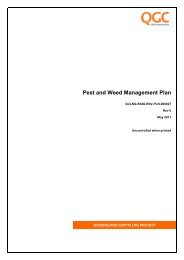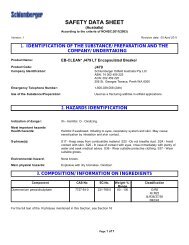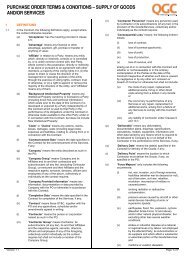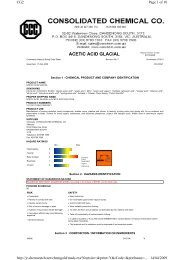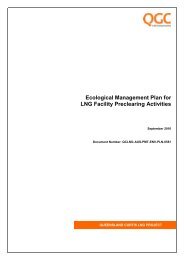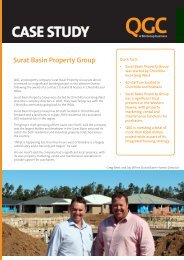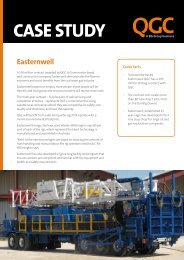Videos bring sustainability to life BG Australia Chairman ... - QGC
Videos bring sustainability to life BG Australia Chairman ... - QGC
Videos bring sustainability to life BG Australia Chairman ... - QGC
- No tags were found...
You also want an ePaper? Increase the reach of your titles
YUMPU automatically turns print PDFs into web optimized ePapers that Google loves.
If these proposals were,therefore, designed <strong>to</strong> protect<strong>Australia</strong>’s water resources,they fail on this logic alone.They were clearly notintroduced <strong>to</strong> deal with anenvironmental problem.They were introduced <strong>to</strong>appease activists.live in their home <strong>to</strong>wns.That is a measure of whatis at stake when we havedecision making on this basis;when green activists andtheir supporters deliberatelymisinform; and when motivesand charges go unquestionedand unchallenged.how they work, how theytreat people, how they dealwith success, and how theydeal with failure.They work hard at understandingwhat drivespeople; what makes themhappy; what makes them sad;what makes them excited.<strong>to</strong> change; the capacity <strong>to</strong>make a difference. In tappingthat capacity, we have <strong>to</strong>believe in something, <strong>to</strong>stand for something.With good intentions,courage and authenticity, wecan own and lead the changewe seek.We have not, of course,advocated that agriculturebe included in the Bill. Wehave, instead, asked that theBill be withdrawn.We believe the proposalsare fundamentally flawedbecause they deal witha fabricated perceptionand not with reality, andwill effectively shift theregula<strong>to</strong>ry goal posts forprojects already approvedby a regula<strong>to</strong>ry regime thatalready works.When fully operational, ourbusiness will contribute morethan A$1 billion a year <strong>to</strong> stateand federal governmentrevenues.That’s equivalent yearlyfunding for more than 20primary schools or about1000 hospital beds.Most importantly, a newspecialised sec<strong>to</strong>r has beencreated, diversifying oureconomy, and creatingnew, skilled, well-paid jobsin regional Queenslandcommunities like Glads<strong>to</strong>ne,Chinchilla, Tara and Dalby.Projects like ours are alsorejuvenating the bush,increasing school enrolments,leading <strong>to</strong> better healthservices, improving roadsand, critically, giving youngpeople a reason <strong>to</strong> work andLeadershipIn practical terms, the lessonsof leadership that I havefound most helpful over theyears have not come fromtextbooks.They have come fromwonderful men<strong>to</strong>rs and theyhave been deeply personal– that is, they are in all of uswhen we look.In my case, I have learnedthat leadership is “owned”by people who lead.They believe in something;they hold their values dearly.I take great satisfactionfrom being part of anindustry that is helpingpeople <strong>to</strong> breathecleaner air in some ofthe developing world’smost populated citiesand is providingelectricity so peopledo not have <strong>to</strong> cookusing firewood,coal or cow dung.They “own” everything theydo – and take responsibilityfor how they behave, howthey speak, how they listen,They refuse <strong>to</strong> be limited byself-doubt, by what peoplemight think, by their ownsense of worth.They have a go.They are courageous.And, most importantly, theyare authentic.They have good intentions– and by this I don’t meana comparison with badintentions; I mean acomparison with having nointentions at all.They say what they mean;they mean what they say.Whether we talk aboutbusiness, politics, religion,sport, science, education,or community, we seem <strong>to</strong>have become a nation thatis crying out for leadership.We commonly hear ourselvestalking about “them” and“they” as those responsiblefor what we sense is a lackof leadership: a failureof “those at the <strong>to</strong>p” <strong>to</strong>make difficult decisions, apropensity for them <strong>to</strong> makeself-interested decisions,and most damning, their lackof intention.It has become easy <strong>to</strong>“outsource” our ailments.We have within each of us thecapacity <strong>to</strong> lead; the capacityThis leads me <strong>to</strong> what Ihave found <strong>to</strong> be the mostuseful question asked bymy business men<strong>to</strong>rs andapplicable <strong>to</strong> every problemI have faced in my businessand personal <strong>life</strong>: So what?I have learned that goodleaders encourage people<strong>to</strong> explain their problems, <strong>to</strong>constructively criticise, and <strong>to</strong>challenge convention.Early in my career, I found itrelatively easy <strong>to</strong> explain thedetail of a problem only <strong>to</strong> beconfronted by much wisermen and women who wouldpatiently listen and then ask:So what do we do about it?This was more difficult; Ihad <strong>to</strong> be more thoughtful;and the people who askedstand out in my <strong>life</strong> becausethey were able <strong>to</strong> createconstructs and environmentswhere people like me wereencouraged <strong>to</strong> work onsolutions.This often meant fixingsimple things first; notbecause they were simple asin easy but that they weresimple as in obvious, and theyrequired good-intentioned,courageous decisions.As a society, it is not enough<strong>to</strong> say things are broken; weneed <strong>to</strong> ask: “So what do wedo <strong>to</strong> fix them.”our business JUNE 2013Page 15


